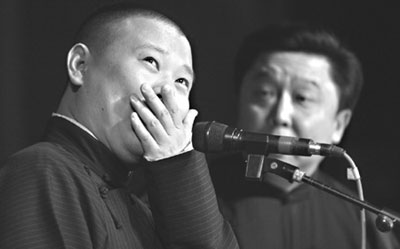Guo Degang has become a new household name in China, quite on a par with
Zhang Yimou and Gong Li.
Off the screen, however, Guo has risen to popularity by word of mouth in
teahouses, such as Beijing's Tianqiao Le and Guangde Lou, where he gives live
performances of xiangsheng, a traditional Chinese comic talk show.

Guo Degang has won
popularity across the country along with the revival of xiangsheng. [China
Daily] |
People pay to listen to his talk because
he and his colleagues make people relaxed, Guo said.
Today, his fans have to book tickets a few weeks in advance.
In Beijing, a regular ticket for a teahouse xiangsheng performance is 20 yuan
(US$2.5 dollars), and in Tianjin it is only 10 yuan (US$1.2 dollars). Such a
performance, lasting for three hours or so, usually consists of seven or eight
pieces.
The comedians are attracting an increasing audience not only with low prices
but also with their ingenuity in poking fun at everyday incidents.
In fact, the shows at teahouses have become so popular that it is often hard
to get a ticket.
And if visitors happen to be in a taxi in North China's Tianjin from 5:30 to
6:30 pm, they will very likely be listening to a radio programme called
"Everyday Xiangsheng."
Xiangsheng is one of the best-liked forms of entertainment in North China,
and "Everyday Xiangsheng" is among the most popular radio programmes in Tianjin.
"I tune in for the programme every day," said taxi driver Liu Xingyi.
"Listening to xiangsheng makes me relaxed, even when I work for long hours."
Popular again
For Yin Xiaosheng, 68, lead performer with the popular Zhong You group in
Tianjin, there was a time in the early 1990s when he thought his beloved
traditional show was dying.
The comic talk show, which appeared in teahouses in the late 19th century
Beijing, was turned into a stage art as part of variety shows in theatres after
New China was founded. The performers became theatre artists, while the number
of teahouses also dwindled as the catering business was not encouraged.
Comic talks enjoyed some popularity in the late 1970s and early 1980s, but
still as a part of TV or theatre variety shows.
And in the 1990s, "very few even talked about xiangsheng," Yin recalled, as
many younger performers became TV hosts or played roles in short comic
theatrical skits.
But Yin and a few of his elderly colleagues, decided they must not give it
up. They returned to a small teahouse called Yanle in Tianjin in 1999, not to
make money but to continue the tradition of xiangsheng.